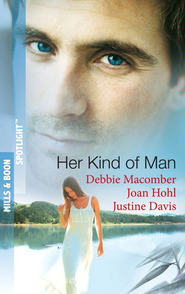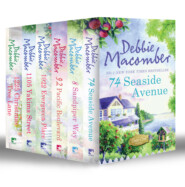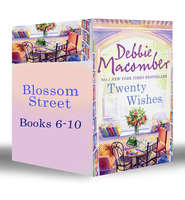По всем вопросам обращайтесь на: info@litportal.ru
(©) 2003-2024.
✖
1022 Evergreen Place
Автор
Год написания книги
2019
Настройки чтения
Размер шрифта
Высота строк
Поля
What he should’ve done was simply be honest. Whoever said honesty was the best policy—Ben Franklin? Mother Teresa? Bill Clinton? Oprah?—was absolutely correct.
Then the following morning, Mack had been on duty at the fire station. He’d felt uncomfortable and anxious about seeing Mary Jo ever since. This was their first encounter since that day.
“I don’t expect to hear from David again,” Mary Jo was saying. “Like you said, I think it was an empty threat. He only wants Noelle so he can manipulate his father into giving him money.”
Mack nodded. “If you do see him, call me and I’ll deal with him.” As soon as the words were out, Mack wished he could take them back. The whole point of breaking off the engagement was to let Mary Jo solve her own problems.
Instead of responding, she occupied herself with rearranging Noelle’s blanket.
Mack rocked back on his heels and removed his hands from his pockets. He wanted to groan. Why couldn’t he keep his mouth shut? “I guess I should check the mail,” he said with a sigh. He’d just headed over to the mailbox when Mary Jo called him back.
“I learned something about those letters.”
“Letters?” Mack asked in confusion.
“The ones I found under the floorboards in the closet.”
That box of World War II letters had completely slipped his mind. “Tell me,” he said quickly.
“I’d rather show you.”
“Okay.”
“Would you like to come by for dinner?” she asked. She bit her lip, as if she wasn’t confident that inviting him was such a good plan, after all. “I don’t want you to feel any obligation….”
“No, I want to,” he said with more enthusiasm than he’d intended. “I mean, if you’re sure about having me over.”
“I am.”
Mack checked his watch. “It’s quarter after six now. Shall we say in an hour?”
“An hour,” she agreed.
His spirits lifted. Maybe he hadn’t ruined everything the way he’d feared. “See you then,” he said with a relieved smile.
“Okay.” She smiled back, and he felt a sudden hopefulness.
Not until he was on his porch steps did it occur to him to ask if there was anything he could contribute. A salad? No, wine was probably better. He turned and, to his surprise, found Mary Jo watching him. Looking guilty, she glanced away.
“What can I bring?” he asked. “For dinner.”
She gave a half shrug. “I’ve got chicken-and-vegetable stew in the Crock-Pot and I’m making biscuits. I can’t think of anything else.”
“How about a bottle of wine?” When she nodded, he said, “See you around seven.”
After collecting the mail, Mack let himself into his side of the duplex, closed the door and breathed deeply. His sense of excitement was nearly overwhelming. In less than an hour he’d have a chance to make up for the foolish, clumsy way he’d ended the engagement—with a lie. He’d have a chance to start again, to reestablish their relationship on a more equal footing.
Fifteen minutes later, Mack had showered, shaved and changed clothes. He threw a load in the washing machine and set the dials. With another half hour to kill, he walked restlessly from room to room. This evening was important, and it could set the tone for many evenings to come.
In the past he’d often visited Mary Jo and Noelle. She’d regularly invited him over but not, he now suspected, out of any great desire for his company. Mary Jo was simply accustomed to having people around. Until recently she’d lived with her three older brothers.
She’d cooked for her family, although Mack knew they did their share of household chores. She was used to preparing meals for three hungry men; no wonder she always made enough to feed a family. So it was easy to invite an additional person, Mack told himself. She didn’t make extra with him in mind.
Not that he was complaining. Far from it. He liked spending time with her, being part of her life. Entertaining Noelle—that was his job most nights. He held and played with the baby while Mary Jo finished dinner preparations, and then later, they sat together and watched television or played cards. She had card sense, as his father would’ve put it. They talked, too, but not about anything deep or too personal. They’d talk about what they’d read or seen on TV, or mutual friends and acquaintances in Cedar Cove. Both were careful to avoid religion and politics, although he guessed they held similar views.
At the end of the evening, he’d kiss her good-night. After their so-called engagement, those kisses had become more brotherly than playful or passionate. That was what had initially convinced him the engagement was all wrong.
Considering the way David Rhodes had treated her, he understood that Mary Jo would be wary of entering a new relationship. Her trust in men—and in her own ability to judge them—had been badly shaken. But surely she’d come to recognize that Mack was a man of his word. That he genuinely cared for her and the baby and would never do anything to bring them harm.
He worried that he wasn’t as good-looking as Rhodes. He wasn’t as smooth, either, but that probably didn’t attract Mary Jo anymore, not after being involved with a player like David. Unlike Rhodes, Mack wasn’t tall, dark and handsome. He was just under six feet and his brown hair had a hint of auburn in it, which accounted for the sprinkling of freckles across the bridge of his nose. He was an average guy, he supposed. He might work for the fire department, but he doubted anyone would select him for one of those hunk calendars.
Mary Jo, however, was beautiful. He wasn’t surprised that someone like David Rhodes would notice her. Mack had long decided that her beauty was part of the problem; it put her out of his league. He was sure she could have her pick of any man she wanted. All Mack could hope for was that, given enough time, she’d want him.
When he knocked at her front door, Mary Jo immediately opened it, almost as if she’d been waiting for him, although that was unlikely to be the case. Noelle cooed from her seat and waved her arms, and he chose to see that as a greeting just for him.
“How’s my girl?” he asked. He handed Mary Jo the bottle of chilled pinot grigio he’d taken from his fridge, then walked into the living room and reached for the baby. As he lifted her in his arms he grinned at Mary Jo. “I’ve only been away a couple of days and I swear she’s grown two inches.”
“She changes every single day,” Mary Jo said. “I see it, too.”
He tickled Noelle’s chin and she gurgled back, which made him laugh.
“There are those World War II letters,” Mary Jo said, pointing at the coffee table.
Mack looked away from Noelle long enough to glance at the cigar box sitting there. He could tell it was faded and a little shabby. “How many letters were inside?”
“Dozens. It didn’t seem like that many when I found them, but the paper is really thin.”
She’d been enthralled by her discovery. Mack was interested, too—who wouldn’t be? These letters were a direct link to history, a personal connection to some of the most momentous events of the previous century.
“The article I read on the internet called this paper onionskin and it said the letters were referred to as V-mail.” She smiled at that. “I think the V stands for victory.” She sat on the sofa and Mack joined her, still holding the baby. He divided his attention between Mary Jo and Noelle.
“I’ve read them twice. They’re addressed to Miss Joan Manry.”
“I remember.” Mack recalled the recipient’s name, now that she mentioned it, although not the sender’s. He cocked his head but couldn’t read the return address. “Who are they from?”
“His name is Jacob Dennison and he was a major stationed in Europe during the war. Some of his letters have black marks on them, but a lot of them don’t have any at all. I assume those marks were put there by censors. You know, I read that there were over two hundred censorship offices. Their job was to ensure that military personnel didn’t reveal anything sensitive in their letters.” She paused. “Of course, that doesn’t explain why these letters were hidden.”
“I’m sure that had more to do with Joan’s circumstances than Jacob’s,” Mack said wryly.
“Well, even with the black marks, I’ve been able to follow quite a bit. They’re fascinating. I can hardly wait for you to read them.”
Mack nodded, caught up in her excitement.
“Joan worked at the Bremerton shipyard,” Mary Jo went on, “and she lived with her older sister. Elaine—that’s her sister—was married and her husband was somewhere in the South Pacific. I gather Joan met the major at a USO dance and they started writing after he shipped out to England.”
Mack gently bounced the baby, to Noelle’s evident approval. “I’d like to take a look at the letters,” he said.
“Here’s the first one. I put them in chronological order.” She unfolded the letter carefully and handed it to him.











